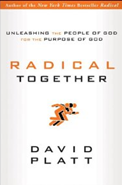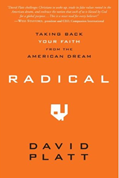 I wanted to hate this book. Okay, hate is a bit strong. I was prepared to dislike this book. In this Blogging for Books program, I’m allowed to pick from a list of five or six books. The last book I got was Radical Together, which I loved, but the list after that was less appealing. I’d heard a bit about Steven Furtick, a young pastor of an exploding church in North Carolina. My impression of him based on what I’d seen, read, and a few videos, was that this would be another shallow, ra-ra, God-wants-to-empower-you-to-achieve-your-dreams-and-help-you-get-what-you-want-out-of-life books. So I figured I’d order the book so I could re-whet the blades of my mind that slice up the prosperity gospel.
I wanted to hate this book. Okay, hate is a bit strong. I was prepared to dislike this book. In this Blogging for Books program, I’m allowed to pick from a list of five or six books. The last book I got was Radical Together, which I loved, but the list after that was less appealing. I’d heard a bit about Steven Furtick, a young pastor of an exploding church in North Carolina. My impression of him based on what I’d seen, read, and a few videos, was that this would be another shallow, ra-ra, God-wants-to-empower-you-to-achieve-your-dreams-and-help-you-get-what-you-want-out-of-life books. So I figured I’d order the book so I could re-whet the blades of my mind that slice up the prosperity gospel.
Once I got the book and started reading, I realized I’d been wrong. I didn’t fully admit it until I reached the end of the book. I even sat there for a few minutes after I closed the book searching my mind for reasons to dismiss this book as vapid and shallow and a waste of paper.
But I couldn’t. I would actually recommend Sun Stand Still. Let me take you through my journey with this book.
Why I thought it would be stupid
I thought this book would be stupid for a few reasons:
The cover and title. I know you’re not supposed to judge a book by its cover but this one looks like just another “name it and claim it” book. SUN STAND STILL is there in big bold letters. The subtitle is “What Happens When You Dare to Ask God for the Impossible.” It sounds like empty jargon.
 The author – Furtick did not impress me with some of the videos of his I saw on YouTube. He struck me as a pastor with a lot of personality and an ability to speak well but without much depth. I’d dismissed him as yet another guy who had faith a mile wide but an inch deep. Also, he has a faux-hawk, soul patch, and smarmy expression on his press picture. Just look at him!
The author – Furtick did not impress me with some of the videos of his I saw on YouTube. He struck me as a pastor with a lot of personality and an ability to speak well but without much depth. I’d dismissed him as yet another guy who had faith a mile wide but an inch deep. Also, he has a faux-hawk, soul patch, and smarmy expression on his press picture. Just look at him!
The endorsements. Without getting specific a few of the names I saw endorsing the book made me think I knew what I was getting into. A couple names made me give it a chance – like Andy Stanley and…okay, nevermind, just one name impressed me.
I have a strong antipathy for stuff I think is jivey. For reasons that are almost certainly explicable by my nerdy background and pride I don’t like it when people coin terms like “Sun Stand Still Prayers” or “Page 23 Vision” or whatever else.
The described purpose of the book, as described by Furtick on the back cover and first chapter: “In short, I’m out to activate your audacious faith. To inspire you to ask God for the impossible. And in the process, to reconnect you with your God-sized purpose and potential.” When I read that, all I see is “blah, blah, blah, God wants you to achieve your dreams, blah, blah, blah.”
When it comes down to it I am a pretty prideful person and my natural tendency if I don’t like something is to assume it is because that thing is flawed in some major way.
What I thought the book would be about (I was wrong)
The title of the book comes from a story in the book of Joshua about God making the sun stand still, extending the day so the Israelites could win a victory. Furtick rightly points out that to even pray such a thing is a bit ridiculous, audacious, and requires a huge amount of faith in God. I thought the book was going to be about how God wants us to accomplish big things and we want to accomplish big things and if we just have enough faith God will bless our faith and we’ll get what we want our of life. Typical prosperity claptrap.
Claptrap seriously just came to my mind first when I wrote that sentence. I need to buy a rocking chair and sit on my front porch yelling at little kids.
What the book ended up being about
As I read through the book it became clear this was not what I was expecting, or even looking for it to be. I don’t like being wrong so I kept trying to find things not to like about the book. I kept looking for holes in his shallow theology. But in the end, this is not a book about God helping you fulfill your dreams.
It’s a book meant to show us that if we really believed the things we say about God (we meaning Christians) that our prayers would sound different and our lives would look different. If I really believed what the Bible has to say, I would be a man of much greater faith. Not faith in God’s ability to accomplish my dreams, but God’s ability to do stuff, period. God’s ability to do major things in the world. And His desire to do them. And His desire to give us a role in what He’s doing.
This book is a part of something bigger going on in my life: a realization that too often I do not live as if the theology I teach and believe and study is true. I teach and preach with conviction that God can do anything and loves us and is involved in our lives, but more often than not my life has been marked by a lack of action that you’d think would follow if those things were true. When it comes down to it, the actions in my life historically demonstrate, from where I stand, a lack of real faith in God for ridiculous things. This is another post – but in this book Furtick most certainly does not build another shallow rah-rah-God wants you to accomplish your dreams book. Instead he tries to bridge the gap that exists for many of us between our theology and our action.
One thing I wanted to cling to
So while there’s a lot I ended up liking despite myself, there was one part of the book that I still am a bit wary of. At one point, Furtick writes that speaking the Word “activates” faith. This is the same terminology used by Word-Faith preachers. Those are people who basically teach that words are “containers” of faith, and if we “speak” something enough, it will come to be. It’s a terrible perversion of what the Bible teaches that gives people a warped perspective on God, themselves, and their role in the world. Furtick’s use of the same terminology got my spider sense tingling a bit but really the rest of the book is so on the right page with this stuff that in and of itself I can’t find fault with what Furtick wrote. Beneath the surface, that section of the book has more in common with Tim Keller’s call for us to preach the gospel to ourselves than it does with Word-Faith’s call to use God as our genie. So Furtick gets a pass from me. I’m sure he’ll be relieved to hear it.
How Furtick really won me over
Many of the issues I thought I’d have with the book centered around the expectation I had that I’d find a name-it-and-claim-it theology. A theology that declares God wants good things for your life, and if you have enough faith and pray big enough prayers, God will give you what you want. The focus is on you and what God can do for you. The focus there is not on God. This is what I expected to find with Sun Stand Still but it wasn’t there. Instead, I found things like…
- A genuine focus on God. One chapter is devoted to the idea that sacrifice is required. God will cut away our selfish dreams and call us to give up things that we want now in order to fulfill His purposes later. And this wasn’t lip service – Furtick really encourages people to pray prayers to pursue God, not our own selfish desires. That’s not a small thing, that’s a big deal.
- The foundation of faith is God’s character. Furtick spent time pointing out that the foundation we should have for our dreams and faith and prayers is God’s faithfulness. He discusses a quote from A.W. Tozer, that “What comes to our minds when we think about God is the most important thing about us…” Our faith (or lack of it) is largely about our beliefs regarding God.
- We don’t deserve anything. So much bad teaching is wrapped up in a belief that we really deserve awesome things! Furtick devotes time to saying – you don’t want what you deserve. We don’t deserve greatness; we deserve condemnation for our sins. It is only by God’s grace that He lovingly interacts with us.
- Bad things still happen. Chapter 13 is probably my favorite and the one that really convinced me Furtick was on a solid, Biblical track. He acknowledges that sometimes “you pray your best, most honest, heartfelt prayers – and there is no answer. Or the answer is no. Sometimes, even though your motives are pure, your desire is good, and your need is urgent, the breakthrough doesn’t come. The turnaround moment doesn’t occur. The cancer spreads. The finances get tighter. The marriage feels more lonely. The kids grow more distant” (p. 137). That kind of honesty is really refreshing and gives Furtick so much more credibility as he talks about audacious faith.
- The process is the point. Furtick ends the book with a few chapters pointing out the fact that we should “push while we pray” and that this faith is not about the end result of us getting what we want, it’s part of God’s process for refining us.
If you’re like me, reading this book might be a good thing.
So in the end – I think this could be a good book. It’s not the best book in the world. But I liked it much more than I thought it would, and it really was a message I needed it hear. First, because it helped me realize that I need to be careful about dismissing people as shallow (or deep) based on my impressions of them or their ministry or whatever. I need to really see what they say. Second, the experience of reading the book and liking it anyway revealed there are depths to my pride I haven’t begun to plumb. And finally, it is a Biblically sound book that encourages big faith for the right reasons. I need more of that in my life. You probably do too.
I was provided with an advance copy of this book by Multnomah Press in order to review it. But everything I just said is still true. The book is like nine bucks. My integrity costs at least triple that.
 An Advent Wreath: We have a small wreath, with spots for four candles on the perimeter and space for one big candle in the middle. Each candle represents a different theme related to Advent. I've found different meanings for each of the candles. I'd say you should have the candle represent whatever the theme of the week is for the Advent Devotional Resource (the next item on this list) you're using. That way it's coherent.
An Advent Wreath: We have a small wreath, with spots for four candles on the perimeter and space for one big candle in the middle. Each candle represents a different theme related to Advent. I've found different meanings for each of the candles. I'd say you should have the candle represent whatever the theme of the week is for the Advent Devotional Resource (the next item on this list) you're using. That way it's coherent. 










